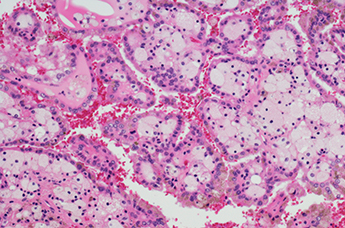How is kidney cancer treated and what is the prognosis?

If you have kidney cancer, you may have a team of several doctors, including urologists (who treat diseases of the urinary system) and oncologists (who specialize in treating cancer with surgery, medication, or radiation therapy). These doctors work together to create a treatment plan that gives you the best chance of a successful outcome.

How is kidney cancer treated?
Based on the type and stage of your cancer, your doctors will recommend a treatment strategy. The plan may include one or more of the following:
active surveillance
surgery
radiation therapy
thermal ablation/radiofrequency ablation
cryosurgery
immunotherapy
targeted therapy
chemotherapy
Active surveillance
Also called watchful waiting, active surveillance means monitoring the cancer to see how it progresses. You will have frequent clinic appointments and imaging tests. This strategy is used mostly in patients with small, slow-growing kidney tumors. Doctors may also recommend active surveillance for people with conditions that make other treatments difficult.
Surgery
Surgery is the most common treatment for kidney cancer and may be the only treatment needed. Your surgeon may perform a radical nephrectomy to remove the entire kidney and some surrounding healthy tissue and lymph nodes. A partial nephrectomy removes the tumor and only part of the kidney. This option preserves more kidney function. When possible, surgeons use minimally invasive methods, such as robotic surgery or laparoscopy (surgery with small instruments performed through tiny incisions).
Radiation therapy
Also called radiotherapy, radiation therapy uses beams of intense energy to kill cancer cells or stop them from growing. Your doctor may recommend radiation therapy instead of surgery if you only have one kidney. It is also an option for people who are not healthy enough for surgery.
Thermal ablation/radiofrequency ablation
Thermal ablation, also called radiofrequency ablation, is a procedure that uses extreme heat to kill cells. Your doctor uses a thin needle inserted in the tumor to deliver heat or electrical currents.
Cryosurgery
Also known as cryoablation, this method uses very cold liquid nitrogen to freeze and kill cancer cells. Your doctor inserts a needle into the tumor and applies the cold gas.
Immunotherapy
Also called biologic therapy, this type of treatment prompts your immune system to fight cancer. Immunotherapy drugs approved to treat kidney cancer include interleukin-2, alpha-interferon, and immune checkpoint inhibitors.
Targeted therapy
Targeted therapies are medications that attack specific parts of cancer cells to stop cancer from spreading. Some targeted therapies approved for kidney cancer block proteins that cancer cells need to survive. Other block blood vessel formation (angiogenesis) to tumors. Unlike chemotherapy, targeted therapies do not affect healthy cells.
Chemotherapy
Medication taken in pill form or through an intravenous (IV) infusion destroys cancer cells or keeps them from growing. Chemotherapy is a systemic therapy that circulates through the whole body. Chemotherapy is rarely used for kidney cancer because the disease does not respond well to these medications.
What research is being conducted in kidney cancer?
Worldwide, researchers continue to seek better ways to identify and treat kidney cancer. As of October 2020, studies were exploring:
additional genes that may lead to kidney cancer
details about each subtype of non-clear cell RCC so that treatment can be more targeted
effects of combining different treatment options to get better outcomes and survival rates
which types of kidney cancer respond best to targeted therapy and immunotherapy
ways to keep kidney cancer from coming back, or recurring
What is the outlook for people with kidney cancer?
Almost 74,000 people will be diagnosed with kidney cancer in the United States this year. Thanks to advances in treatments, the prognosis and quality of life for people with kidney cancer continues to improve. For some people, the disease is curable with various treatments or combinations of treatments. Many factors influence your individual prognosis, including:
age
overall health and performance status (how well you can do everyday activities)
how well your cancer responds to treatment
blood test results (including lactate dehydrogenase, calcium, red blood cells and platelets)
red blood cell count
Your doctor also may use two well-established tools to estimate prognosis and help determine an individualized treatment plan. The tools consider some of the above factors and create a score:
Kidney cancer survival rates
Overall, about 75% of people diagnosed with kidney cancer are still alive five years after diagnosis. The earlier the cancer is detected, the better:
65% of kidney cancer cases are local, meaning the cancer has not spread to other parts of the body. The five-year survival rate for localized kidney cancer is 93%.
16% of kidney cancer cases are regional, meaning the cancer has spread to nearby lymph nodes. The five-year survival rate for regional kidney cancer is 70%.
16% of kidney cancer cases spread to other parts of the body. The five-year survival rate for distant, also called metastatic, kidney cancer is 13%.
Some cases are unstaged or unknown, about 3% of the time. The five-year survival rate for those patients averages 42%.
From the community: “I’m a 30 year old male and have been diagnosed with RCC of my left kidney (based on imaging it’s suspicious for RCC). It’s a larger mass around 9cm. I had zero symptoms/no blood in urine or anything. They found it accidentally when I was getting a scan on my back due to a minor car accident. I have had several MRI and CT scans, it has not spread. According to the images and a surgery to remove my kidney would be “curative,” according to my oncologist. … I could have gone with a partial removal but after talking to the urologist, it sounded better to have the whole thing removed to avoid any complications that partial can bring (urine leakage, etc).” - Inspire member
Sources
About Kidney Cancer. American Cancer Society. February 2020.
Survival Rates for Kidney Cancer. American Cancer Society. February 2020.
What’s New in Kidney Cancer Research? American Cancer Society. February 2020.
Kidney Cancer: Types of Treatment. American Society of Clinical Oncology. August 2019.
Gale Harding G, et al. Symptom burden among patients with renal cell carcinoma (RCC): content for a symptom index. Health and Quality of Life Outcomes. June 2007.
Cancer Stat Facts: Kidney and Renal Pelvis Cancer. National Cancer Institute.
Clear Cell Renal Cell Carcinoma. National Cancer Institute. March 2020.
Genetics of Kidney Cancer (Renal Cell Cancer) (PDQ®) – Health Professional Version. National Cancer Institute. May 2020.
Renal Cell Cancer Treatment (PDQ®) – Patient Version. National Cancer Institute. July 2020.
What Is Kidney Cancer? Urology Care Foundation.
Disclaimer
Member comments are lightly edited for length and to remove identifying information but are otherwise reproduced as they appear in the community as part of public posts.
This content is for general informational purposes only and does not necessarily reflect the views and opinions of any organization or individual. The content should not be used as a substitute for professional medical advice, diagnosis, or treatment. Please consult your healthcare provider about any questions you may have regarding a medical condition.




